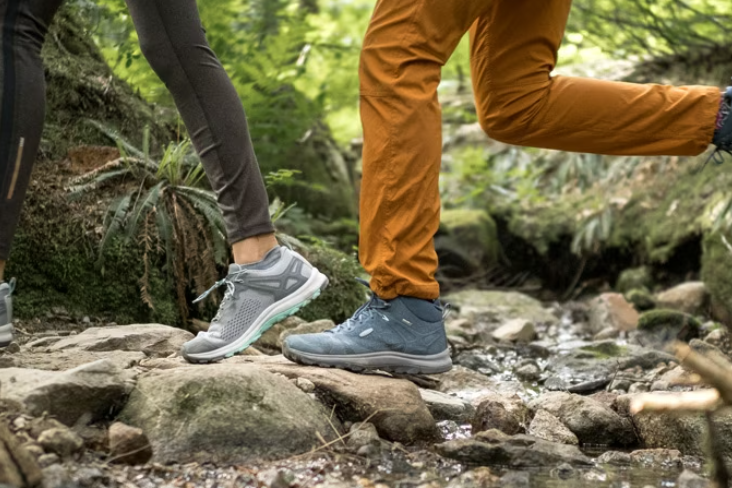Hiking Boots vs. Trail Runners: The Great Debate

Newbie hikers or those looking to replace an older pair of hiking boots often ask the question these days: Do I have to buy a pair of burly boots to hike in the woods or go backpacking? Of course not. After all, there are people who thru-hike the Appalachian Trail (AT) in their bare feet.
If you asked the boot question, though, you were probably wondering: Would a pair of trail runners be an acceptable alternative—or an even better choice than a pair of heavy hiking boots? We asked footwear guru Beth Henkes in our REI Alderwood store in Washington to tell us how she helps customers decide between boots and shoes. The simple answer is that both hiking boots and trail runners will get you out on the trail, but where, when and how you hike may impact your choice.
Henkes confesses customers today seem to have a thing for trail runners. Some are obsessed with their light weight; others love how comfortable they feel right out of the box, while the more fashion conscious might prefer the wide range of designs and colors. No one choice is right for all, though, and boots still have much to offer.
Here are the key questions for choosing between boots and trail runners:
1. New to hiking? Keeping yourself upright on trails while wearing a pack takes a while to master. The wide, thick soles on hiking boots will provide a stable base for every footfall.
2. What’s the terrain on your trail? Sketchy trails require beefier boots for both stability and the ability to stand up to wear and tear. And their stout soles can handle abuse from rocks and roots, so your feet don’t have to. If it’s a beautiful, meandering forest trail, though, light and lean footwear will work fine. If it’s a paved nature trail, even a pair of city sneakers can handle it. If you expect to hike in cold, wet conditions, you might prefer the warmth and protection of a sturdy boot with a waterproof membrane, but you can find waterproof trail-running shoes as well.
3. What’s your body type? You likely already have a sense of whether your body requires more support from your footwear in general. If it does, and you plan to add a heavy pack to your overall weight, a solid, stable hiking boot may be your best choice. If you haven’t had any previous issues with strength and stability of your legs and joints and you’re not planning to carry a significantly heavy load, you’re probably a good trail-runner candidate.
4. How fast will you be going? Is it a slow and steady sojourn or a speed hike? Lightweight trail runners make it easier to maintain a brisk pace. That’s why many thru-hikers wear them, because they need to knock off huge chunks of miles, day after day. Of course, on a trail as long as the AT they’ll go through several pairs of trail runners.
Comparing Traction
Hiking boots generally have thick lugs to bite into soil and a rubber that grips well on a variety of surfaces. Light trail runners offer minimal grip, but rugged and off-trail styles offer similar traction to hiking shoes. Some trail runners also feature a sticky rubber compound for enhanced grip on wet rocks and logs.
Be aware, though, says Henkes, that many trail runners are actually designed to grip on the fly and they won’t have the same level of traction at a slower hiking pace. The physics change when you apply less force on each stride.
